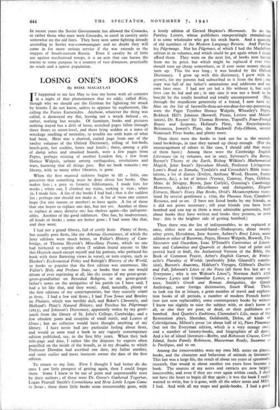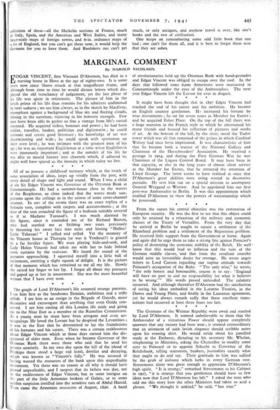LOSING ONE'S BOOKS
By ROSE MACA-ULAY
IT happened to me last May to lose my home with all contents in a night of that phenomenon that we oddly called Blitz, though why we should use the German for lightning for attack by bombS I do not know, unless to appease by euphemism, like calling the Furies Eumenides. Anyhow, whatever the thing was called, it destroyed my flat, leaving not a wrack behind , or, rather, nothing but wracks. Of furniture, books and pictures nothing stayed but a drift of loose, scorched pages fallen through three floors to street-level, and there lying sodden in a mass of wreckage smelling of mortality, to trouble me with hints of what had been. Here was a charred, curled page from one of the twelve volumes of the Oxford Dictionary, telling of hot-beds, botch-pots, hot cockles, hotes and hotels ; there, .among a pile of damp ashes and smashed boards, were a few pages from Pepys, perhaps relating of another London fire, a few from Horace Walpole, urbane among earthquakes,. revolutions and wars, knowing that all things pass. But no book remains ; my library, with so many other libraries, is gone.
When the first stunned sickness begins to lift d little, one perceives that something must be done about lost books. One makes lists ; a prey to frenetic bibliomania, I made lists for weeks ; when out, I climbed my ruins, seeking it vain ; when in, I made lists. A list of the books I had had ; that is the saddest list ; perhaps one should not make it. A list of chose one cannot hope (for one reason or another) to have again. A list of those that one hopes to replace one day, but not yet. Another of those to replace at once, directly one has shelves again—the indispens- ables. Another of the good riddances. One has, by inadvertence, all kinds of books ; some are better gone ; I had some like that, and they went.
I had not a grand library, full of costly firsts Plenty of firsts, but usually poor firsts, like my Athenae Oxonienses, of which the later editions were much better, or Fuller's History of Cam.- bridge, or Thomas Heyrick's Miscellany Poems, which no one had bothered to reprint often (I seldom found anyone to like this Heyrick much except myself and his patrons, who prefaced his book with their flattering views in verse), or torn copies, such as Hooker's Ecclesiastical Polity and Raleigh's History of the World, or books so popular that the first edition was enormous, bite Fuller's Holy and Profane State, or books that no one would tifeam of ever reprinting at all, like the essays of my great-great- great-grandfather on Revealed Religion, or my great-grand- father's notes on the antiquities of his parish (as I have said, I had a lot like that, and they went). And, naturally, plenty of the first editions of my contemporaries, but they scarcely count as firsts. I had a few real firsts ; I had Tom Jones and Bentley on Phalarts, which was terribly dull, and Baker's Chronicle, and Holland's Pliny's Natural History, and Purchas his Pilgrimage (1613), and Johnson's Dictionary, apparently stolen by my great- uncle from the library of St. John's College, Cambridge, and a few obsolete poets and essayists of small merit, and Leaves of
Grass ; but no collector would have thought anything of my library. I have never had any particular feeling about firsts, and would as soon read a book in any vaguely contemporary edition published, say, in the first fifty years. When they lack title-page and date, I rather like the disputes by experts often pencilled on the inside of the boards, as in my Arcadia, to which Professor Dowden had ascribed one date, my father another, and some earlier and more innocent owner the date of the first edition.
To return to my lists. First I thought I had better do the ones I saW little prospect of getting again, then I could forget them. Some I knew to be out of print and unprocurable even by their authors ; of these were Dr. Gosse's Gathered Together, Logan Pearsall Smith's Cornishiana and How Little Logan Came to Jesus ; these three little books seem irrecoverably gone, with
a lovely edition of Gerard Hopkins's Mermaids. So do the Purefoy Letters, whose publishers exasperatingly remaindered it to some wholesaler who got his stock burnt. And a quantity of old numbers of the Modern Language Review. And Purchas his Pilgrimage. Not his Pilgrimes, of which I had the Maclehose edition in 20 volumes, and which could be got again when I could afford them. They went on the next list, of books now barred from me by price, but which might be replaced if ever they should turn up cheap somewhere, or if ever some money should turn up. This list was long ; it was headed by the Oxford Dictionary. I grew up with this dictionary, I grew with its growth, for my parents had subscribed to it from the first ; my copy was full of my father's annotations and additions and my own later ones. I had not yet led a life without it, but such lives can be led and are ; in any case it was not a book to be bought by the totally bombed and totally uncompensated (But, through the munificent generosity of a friend, I now have it.) Also on the list of farewells-thou-art-too-dear-for-my-possessing were the •Paget Toynbee Horace Walpole, Wheatley's Pepys, Birkbeck Hill's Johnson (Boswell, Piozzi, Letters and Miscel- lanies), Dr. Keynes' Sir Thomas- BroWne, Topsell's Four-Footed Beasts and Serpents, Holland's Pliny, the Encyclopaedia Britannica, Jowett's Plato, the Blackwell Poly-Olbion, several Nonesuch Press books, and plenty more.
Then there were the books to look out for in the second- hand bookshops, in case they turned up cheap-enough. (For the encouragement of others in like case, I should add that many of them have.) Among these were the Cambridge English Literature (in 15 volumes, not in one), Sylvester's Du Bartas, Burnet's Theory of the Earth, Bishop Wilkins's Mathematical Magick, John Swan's Speculum Mundi, Professor Livingstone Lowe's Road to Xanadu, Tyndale's and Coverdale's Bible trans- lations, a lot of diaries (Evelyn, Anthony Wood, Hearne, Fanny Burney, &c.), a lot of letters (Verney, Conway, Pope, Gibbon, Mine. de Sevigny, Byron, Jane Carlyle), Gunning's Cambridge Memories, Aubrey's Miscellanies and Antiquities, Elegant Extracts, Hone's Every Day Books, Ovid's Metamorphosis trans- lated by several gentlemen c. 17oo, the Phoenix Nest, Camden's Reviews, and so on. (I have not listed books by my friends, as it did not prove necessary ; tell your friends you have been bombed and you tap in them a. most admirable generosity, both about books they have written and books they possess, or even buy : this is the brighter side of getting bombed.) Then there was the list of indispensables, to ne replaced at once, either new or second-hand—Shakespeare, about twenty other poets, Herodotus, Jane Austen, Aubrey's Brief Lives, some edition or other of Barowne, Pepys, Horace Walpole, Boswell, The Spectator and Guardian, Isaac D'Israeli's Curiosities of Litera- ture and Calamities and Quarrels of Authors (out of print and proved hard to find), the Authorised Version of the Bible, the Book of Common Prayer, Arber's English Garner, de Fonta- nelle's Plurality of Worlds (preferably John Glanvill's transla- tion), Burton's Anatomy, Hakluyt's Voyages, Gibbon's Decline and Fall, Johnson's Lives of the Poets (all these five last are in Everyman ; why is not Walton's Lives?), Norman Ault's 17th Century Lyrics and Unfamiliar Lyrics, a Shakespeare concord- ance, Smith's Greek and Roman Antiquities, the Greek Anthology, some foreign dictionaries, South Wind. Then, to look out for at leisure, a great number of travel and explora- tion books of all periods, a number of modern French books (not just now replaceable), some contemporary books by writers I know too slightly to raise the subject with, or don't know at all, or else they are poor, or dead, or their publishers, are bombed. And Quarles's Emblems, Clarendon's Life, most of the Restoration plays, Sheridan, Goldsmith, Defoe, all kinds of Coleridgeiana, Milton's prose (or about half of it), Piers Plowman (but not the Everyman edition, which is a very strange one), and a number of history-books, and biographies of all dates. And a lot of island literature—Beebe, and Robinson Crusoe, Coral Island, Swiss Family Robinson, Masterman Ready, Suzanne et la Pacifique, and so on.
Among the irrecoverables were my own MS. notes on places, books, and the character and behaviour of animals in literature. This last was a large file,- the result of about ten years of spasmodic research, that would in about another ten years have become a book. The sources of my notes and extracts are now largely inaccessible, and even if they are ever again within leach, I shall not have the heart to begin all that again ; it was the book I really wanted to write, but it is gone, with all the other notes and MSS. I had. And with all my maps and guide-books. I had a good
collection of these—all the Michelin sections of France, much of Italy, Spain, and the Americas and West Indies, and many large-scale maps of foreign towns, and 6-in, ordnance maps of a lot of England, but you can't get these now, it would help the Germans for you to have them. And Baedekers one can't get
much, or only antiques, and anyhow travel is over, like one's books and the rest of civilisation.
One keeps on remembering some odd little book that one had ; one can't list them all, and it is best to forget them now that they are ashes.























 Previous page
Previous page